Khamenei Aide Says Iran Would Use ‘All Means’ to Back Hezbollah
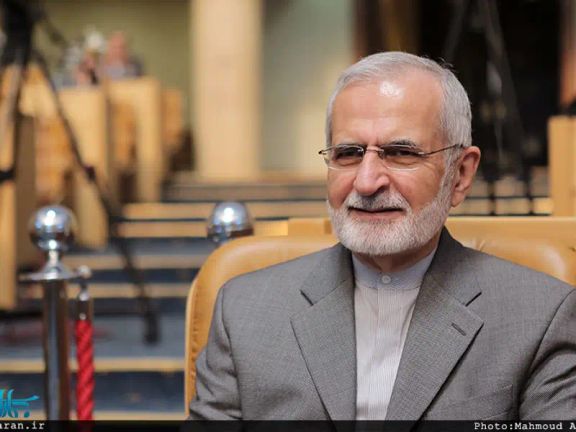
An adviser to Iran’s supreme leader has issued a warning that an all-out Israeli offensive against Hezbollah could trigger a regional war.

An adviser to Iran’s supreme leader has issued a warning that an all-out Israeli offensive against Hezbollah could trigger a regional war.
Kamal Kharrazi, foreign affairs adviser to Ali Khamenei, stated that Tehran and the “axis of resistance” would support the Lebanese militant movement with “all means.”
“All Lebanese people, Arab countries, and members of the axis of resistance will support Lebanon against Israel," he said.
Hezbollah, Iran's most formidable proxy, funded, trained, and armed by Tehran, continues its daily skirmishes with Israeli forces amid the ongoing Gaza conflict.
In an interview with the Financial Times on Tuesday, Kharrazi claimed that the Islamic Republic was “not interested” in a regional conflict and urged the US to pressure Israel to prevent further escalation. Meanwhile, Iran's regional proxies continue to attack both Israel and US targets in the region.
Kharrazi emphasized the risk of the conflict spreading, stating, “There would be a chance of expansion of the war to the whole region, in which all countries including Iran would become engaged. In that situation, we would have no choice but to support Hezbollah by all means.”
Lebanon's Hezbollah began targeting Israel after the eruption of the Gaza war, sparked by Iran-backed Hamas's invasion of October 7. At least 1,200 mostly civilians were killed and 250 more taken hostage.
The supreme leader's aide added, “The expansion of war is not in the interest of anyone — not Iran or the US.”
In April, Iran launched the first direct attack on Israel with a barrage of 350 missiles and drones following an alleged Israeli strike on Iran's consulate in Syria targeting a senior Quds Force commander and other senior IRGC figures.
A US-led coalition intercepted most of the projectiles in what was seen as the beginning of direct conflict between the two arch-enemies.
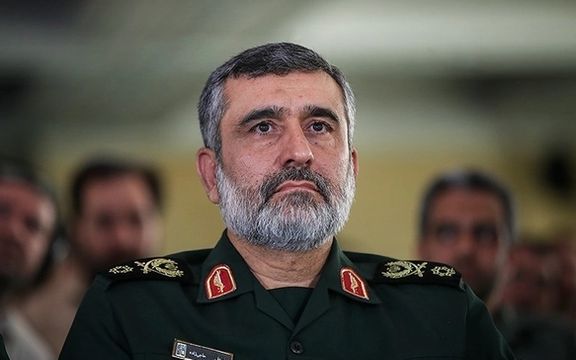
Amir-Ali Hajizadeh, the commander of the Aerospace Division of the Islamic Revolutionary Guard Corps (IRGC), expressed an “eagerness” to launch another attack on Israel.
"In the Operation True Promise on April 13, we fired 300 missiles (at Israel). We're eager for the opportunity for Operation True Promise 2, for which I do not know how many missiles should be used," Hajizadeh said on Monday.
Iran launched its first ever direct strike on Israeli territory on April 13, dubbed "Operation True Promise" by Tehran. It involved over 350 drones and missiles. 99% of these projectiles were intercepted by a coalition led by the US, according to the Israeli military.
The attack was purportedly in retaliation for an alleged Israeli strike on the Iranian consulate in Damascus, which resulted in the deaths of seven IRGC officers, including a senior commander.
While confirming that Iran is supplying weapons to Hezbollah in Lebanon, Hamas in Gaza and other militias in the region, the commander highlighted two additional IRGC attacks as deterrents against Israel and the US in the area.
“As evidenced by the weaponry utilized by our allies in Palestine, Lebanon, and other regions, it is unequivocally apparent that Iran provides substantial support and sustenance. We have consistently fulfilled our commitments and will unwaveringly continue to do so in the future,” the IRGC commander added.
Hajizadeh referred to two previous attacks by the IRGC. The first instance occurred in 2019 when Iran downed a US military drone, a Global Hawk, claiming it was on a spy mission over Iranian territory. Washington contended that the drone was targeted in international airspace in what it described as an "unprovoked attack."
The second incident took place in 2020 when the IRGC launched over 12 ballistic missiles at the Al Asad Airbase in Al Anbar Governorate, western Iraq, and another airbase in Erbil in retaliation for the assassination of IRGC commander Qassem Soleimani by a US drone strike.
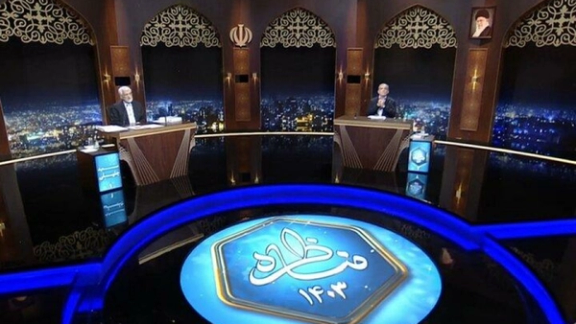
Iranian pro-reform candidate Masoud Pezeshkian said on Monday that the low turnout in Iran’s presidential election was “unacceptable” and a sign of flaws in the system, while his hardline rival Saeed Jalili called for strategies to encourage greater voter participation.
The June 28 presidential election marked the lowest voter turnout in the history of the Islamic Republic, with only 39.92 percent participation. This breaks the previous record set during the last election, in which the late President Ebrahim Raisi won with a turnout of 48 percent.
In a televised debate ahead of the runoff election on July 5, Pezeshkian said the concerns of the 60 percent who abstained from voting should be addressed, stressing the importance of caring for all Iranians, especially women and ethnic groups.
Jalili said, "If the current situation is far from the desired level of public participation, we must motivate people with a plan to move towards the desired participation."
Both candidates tried to garner support from Sunni Muslims. Pezeshkian criticized the exclusion of Sunnis from key government positions. Jalili also pledged to restore Sunni rights if elected.
Foreign Policy and Sanctions
On foreign policy, Pezeshkian emphasized the importance of expanding Iran's international ties, prioritizing neighboring countries first and then other nations to achieve economic growth. He defended the 2015 nuclear deal (JCPOA), and said why figures like Israeli Prime Minister Benjamin Netanyahu, former US President Donald Trump, and Saudi Arabia opposed the deal if it was against Iran’s interests.
Pezeshkian highlighted the "huge" financial losses incurred without the nuclear agreement and urged adopting the Financial Action Task Force (FATF) regulations, comparing it to FIFA in international sports where non-compliance results in exclusion from global engagements.
Jalili criticized the focus on expansion of ties with just "three world powers" in the moderate faction's foreign policy, arguing that there are over 200 countries that Iran should engage with to seize various opportunities.
He said Iran currently sells "less than two million barrels of oil per day" at standard rates despite the US sanctions.
Pezeshkian asked why despite huge oil sales, the lives of ordinary Iranians remain "miserable".
"Why don't you tell the people at what rate you are selling the country's oil?" he asked.
Smear Campaigns
In another part of the debate, both candidates tried to address smear campaigns against them. Jalili had brought a thick pamphlet which he said was comprised of the articles published online against him. He claimed that supporters of Pezeshkian called his supporters “Taliban” while Pezeshkian said Jalili’s supporters called him “munafiq”.
In Islamic term Munafiq is a person who in public and in community shows that he is a Muslim but rejects Islam or speaks against it either in his heart or among the enemies of Islam. The hypocrisy itself is called nifāq.
Internet Censorship and Technology
Jalili said the already-restricted social media platforms (like Telegram, X, and Instagram) must comply with the Islamic Republic’s regulations to operate in Iran. The hardliner also pledged to significantly increase mobile and home internet speeds if elected.
Pezeshkian explicitly defended the Islamic Republic's restriction of internet and claimed that all governments impose internet restrictions during special times, such as protests or strikes. However, he argued that there is no justification for the current restrictions forcing citizens to rely on VPNs as there is no "special" situation in the country.
Final Words
Pezeshkian, a former health minister and deputy speaker of Parliament said Jalili lacked necessary qualifications to run the country.
"One who has not run even a department is not qualified to run an organization," Pezeshkian said.
Jalili referred his experience in the foreign ministry, and also as the Secretary of the Supreme National Security Council.
Pezeshkian said the Secretary was not the one who made top decisions, and those policies were the decided by Iran's leader Ayatollah Khamenei.
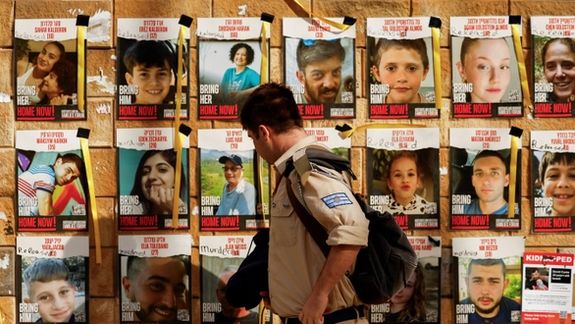
More than 100 victims and relatives of victims of the Oct. 7 attack by Hamas in Israel sued Iran, Syria and North Korea for $4 billion on Monday, accusing the countries of providing Hamas support.
The lawsuit filed in federal court in Washington, DC, by the Anti-Defamation League is the largest case against foreign countries in connection with the attack, and the first backed by a Jewish organization, the ADL said in a press release.
Iran’s Islamic government, the main financial and military supporter of Hamas, has openly praised the attack, pledging to continue it backing of the militant group. It has also praised efforts by its proxy groups in the region to support Hamas and attack Israel.
The lawsuit accuses the three countries of providing financial, military and tactical support to Hamas. The US government has designed Iran, Syria and North Korea state sponsors of terrorism.
More than 1,200 people were killed in the attack and 250 others were taken hostage, according to Israeli tallies. The plaintiffs in the case include US citizens injured on Oct. 7, as well as relatives and the estates of victims killed in the attack.
"Iran is the world's leading state sponsor of antisemitism and terror – along with Syria and North Korea, they must be held responsible for their roles in the largest antisemitic attack since the Holocaust," ADL Chief Executive Jonathan Greenblatt said in a statement.
Iran already faced several similar lawsuits in connection with the Oct. 7 attack.
The Iran, North Korea and Syria missions to the United Nations in New York did not immediately respond to a Reuters request for comment.
It is common for countries accused of state-sponsored terrorism to ignore lawsuits in the US and not to honor judgments against them in US courts.
However, the United States Justice Department has a program called Victims of State Sponsored Terrorism Fund(USVSST Fund), which provides compensation to individuals (or personal representatives of deceased individuals) who hold a final judgment issued by a United States District Court awarding the individual compensatory damages.
So far, the fund has made four distributions to victims from appropriations by the US Congress and collections from unlawful activities by individuals and affiliates of state sponsors of terrorism after successful prosecutions. The Justice Department is planning a $940 million distribution for 2025.
But the fund has run low, prompting several members of Congress to introduce legislation in May that would enhance funding and guarantee annual payments to victims.
If the defendants in this case are found liable, the plaintiffs hope to tap the USVSST, which Congress created in 2015 to compensate individuals who have won judgments against state sponsors of terrorism.
Monday's lawsuit seeks at least $1 billion of compensatory damages and $3 billion of punitive damages.
"While nothing will ever undo the unbearable pain Hamas caused our family or the brutal losses we've suffered, we hope this case will bring some sense of justice," plaintiff Nahar Neta, whose American-born mother Adrienne Neta was killed on Oct. 7, said in a statement.
The law firm of Crowell & Moring also represents the plaintiffs.
With reporting by Reuters
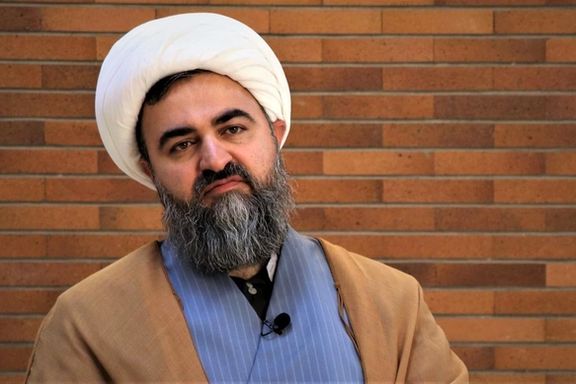
A Shia cleric critical of Iran’s Supreme Leader says a wave of confidence has swept through dissidents after 60% of voters refused to participate in the June 28 presidential election.
Mohammad Taghi Akbarnejad, a conservative cleric teaching at the Qom seminary, made the comment Sunday during a YouTube debate on “Boycotting or Participating in Elections.”
Highlighting the newfound confidence among the dissidents, he said the election result represented a shift in public opinion. He labeled it a “new national identity” and called on the authorities to accept it.
At least 60 percent of the 61.5 million eligible voters abstained from voting on June 28, according to official figures. However, many believe the turnout was even lower than officially reported, possibly as low as 20 percent, suggesting that over 80 percent of voters might have boycotted the election.
"See the confidence that has been instilled among the dissidents. Before the election, we hadn't anticipated that 60% of the people would abstain. The nation has suddenly come forward and declared, 'We are here, and we understand.' The next step is to embrace the nation's new identity."
Describing it as an “asset," he added that the low voter turnout can be used for change if leaders can channel the underlying public dissatisfaction into a focused movement. He said that expressing dissent, even through non-participation, can be a powerful force for change, as shown by Rouhollah Khomeini's successful mobilization during the Islamic Revolution in 1979.
"If the elites can turn this into a movement and identify the demands of this 60% and become their voice, they can use it for future steps. That’s the role of a politician. It’s a significant asset declaring opposition. What did Ayatollah Khomeini do? He turned this dissent into 'Death to the Shah slogans.'"
Throughout the program, Akbarnejad insisted that he does not promote regime change in Iran. He was arrested and transferred to an undisclosed location in February for his critical comments about parliamentary elections that took place on March 1, "insulting" Supreme Leader Ali Khamenei and criticizing the Islamic Republic’s track record during the past 45 years." He later announced in an audio file that he had been released on bail. Following his arrest, the number of his followers on Instagram rose from around 1,000 to over 93,000.
His arrest happened after a video of him went viral in which he said that "both voting and not voting in the elections carry a message to the government and reflect people's reaction to the officials' [objectionable] performance." He also directly challenged the leaders of the Islamic Republic by questioning the practical benefits of religion for the people. "I do not believe in a religion that does not serve the nation's interests," he boldly declared.
Elsewhere during the Sunday debate, he asserted that public trust in the government has eroded to an unprecedented extent, marking a stark contrast to the era when reformists held sway. "The public is no longer easily duped; they are prepared to pay the price."
He implored the government to uphold Article 27 of the Constitution and acknowledge the people's right to protest, cautioning the Islamic Republic: "Even in your own self-interest, if you want to remain in power, you must yield to the people's will."
According to Article 27 of the Constitution, "Gatherings and demonstrations without arms, provided that they do not contravene the foundations of Islam, shall be free."
With pro-reform Masoud Pezeshkian and ultra-hardliner Saeed Jalili in Iran's July 5 runoff, debates among Iranians over participation are heating up. Some advocate voting for Pezeshkian to prevent Jalili's win, while others consider boycotting the vote once again.
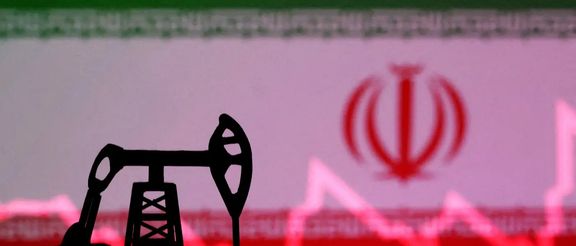
A member of Iran’s Expediency Discernment Council has revealed details about large discounts being offered to buyers to sell oil sanctioned by the United States.
Majid Ansari, in an interview with ILNA news website in Tehran on Monday, highlighted the questionable practices of a clandestine group reportedly evading sanctions to sell Iranian oil. He stated that they claim to bypass sanctions by using "diversionary paths," transporting 1.3 million barrels of oil daily at “discounts ranging from $15 to $30 per barrel, averaging a $20 discount per barrel.”
That would total more than $25 million per day, or more than $9 billion annually, while Iran suffers from a serious shortage of hard currencies for essential imports.
Ansari questioned the transparency of such operations, demanding the identities of those involved in the oil sales to be made public. He criticized the lack of disclosure, citing arguments that revealing the sellers would alert "enemies," and naming buyers would cause them to withdraw due to US monitoring.
The United States announced third-party sanctions against countries and businesses engaging in trading Iranian oil after former President Donald Trump withdrew from the JCPOA nuclear deal in 2028. Trump demanded re-negotiations over Iran's nuclear program and a change in Tehran's aggressive regional behavior.
Iran's oil exports plummeted from more than two million barrels per day to less than 300,000 by 2019, drastically reducing its main source of foreign currency income. However, after President Joe Biden signaled his intention to return to the nuclear agreement, China began buying large quantities of Iran oil and shipments reached 1.3 million in 2023. Iran International reported earlier in the day that Tehran's oil exports have surpassed 1.5 million barrels in recent months.
Further, Ansari expressed frustration over the secrecy surrounding financial details. He stated that when asked about the selling price, the response was that it is "confidential." Regarding the money deposits, it was claimed that the US has sanctioned the banks, but the money returns through exchange offices, the ownership of which remains "confidential." The bulk of the money is in one country, presumably China, which does not pay in cash and instead offers to sell its goods to Iran. The importers of these goods also remain anonymous.
In the past decade, several large corruption scandals emerged in Iran related to circumvention of oil sanctions, with one individual arrested and accused of pocketing $2.7 billion of oil export proceeds.
Ansari highlighted the financial loss to the Iranian people due to oil discounts, stating that 1.3 million barrels of oil per day at a $20 discount results in a daily loss of $26 million for Iranian citizens, farmers, and the government. "This is a huge loss to our nation," he emphasized.
During recent presidential election campaigns, some hardline candidates, including ultraconservative Saeed Jalili, boasted about increased oil sales under late President Ebrahim Raisi, who died in a helicopter crash last month. However, former Foreign Minister Javad Zarif criticized the narrative during a TV roundtable, arguing that the increase was due to the lenient policies of the Biden administration rather than domestic achievements.